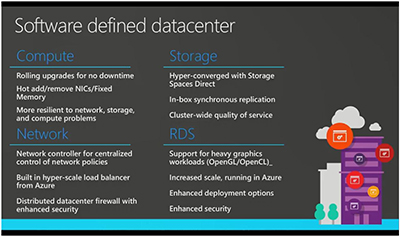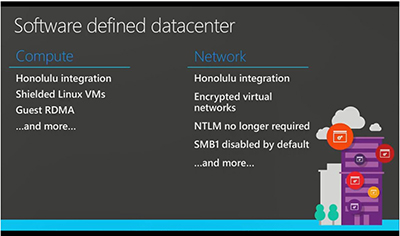News
Windows Server Version 1709 Lacks Storage Spaces Direct
Windows Server version 1709, released earlier this week, doesn't include Microsoft's highly touted Storage Spaces Direct capability.
In addition, prospective users of this service-enabled version of Windows Server 2016 may be surprised to find that there is no "Essentials" edition with the release of Windows Server version 1709. There also are only Standard and Datacenter editions, per a Microsoft document description. Moreover, organizations can only use the Server Core deployment option with Windows Server version 1709.
Windows Server version 1709 is different from Windows Server 2016 in that it gets more frequent updates. Version 1709 follows Microsoft's "semiannual channel" (spring/fall) update scheme seen with Windows 10 and Office 365 ProPlus. The idea is that Microsoft can add new features faster than it can for traditionally installed software products.
The lack of Storage Space Direct in Windows Server version 1709, though, is perhaps a surprising turn for the new service-enabled server product because it's one of the key pillars of Microsoft's hyperconverged infrastructure enhancements in Windows Server 2016. According to this Microsoft document description, "Storage Spaces Direct is included in Windows Server 2016 Datacenter and Windows Server Insider Preview Builds." Microsoft noted its absence in version 1709 in this "Release Notes" document.
Storage Spaces Direct permits the use of newer and cheaper storage devices, such as SATA, SSD and NVMe disks. It also simplifies storage and compute for datacenters, according to Microsoft's past descriptions.
The Release Notes for Windows Server version 1709 indicated that its new hyperconverged features "have not yet achieved the level of validation for production deployment, so we decided to keep them in preview for a little longer and skip Windows Server, version 1709." It also suggested those hyperconverged improvements might show up in the next service-enabled Windows Server test release.
A Microsoft spokesperson offered the following explanation, via e-mail, about why Storage Spaces Direct isn't supported in Windows Server version 1709:
Storage Spaces Direct was introduced in Windows Server 2016 and remains the foundation for our hyper-converged story. Following our successful Windows Server 2016 release, we've listened to our customers and are already working to deliver the next set of innovation to our hyper-converged story. We elected to keep these features in preview, for the Windows Server, version 1709 train. There will be another train available soon, as the new Semi-Annual Channel release provides a more rapid release cadence for greater flexibility and faster innovation for our customers.
A September Microsoft Ignite session, "What's new in Windows Server, version 1709 for the software-defined datacenter," included a description of Storage Spaces Direct improvements without mentioning that the version 1709 release would lack that capability.
Jeff Woolsey, principal program manager at Microsoft, presented a partial view of Microsoft's software-defined improvements for Windows Server in this overview slide from the Ignite session:
 [Click on image for larger view.] Figure 1. Overall software-defined improvements in Windows Server 2016. Source: Microsoft Ignite 2017 session.
[Click on image for larger view.] Figure 1. Overall software-defined improvements in Windows Server 2016. Source: Microsoft Ignite 2017 session.
As for the future software-defined improvements, Wooley emphasized server management via Project Honolulu, currently at the technical preview stage, which is Microsoft's browser-based replacement for its deprecated Server Management Tools. Project Honolulu includes a hyperconverged cluster manager tool for Windows Server 2016, but that tool doesn't manage earlier Windows server versions like Windows Server 2012, Woolsey indicated. He also stressed support for Shielded Linux Virtual Machines (a security feature that protects against VM copying) and that NTLM will no longer be required for clusters. He also noted that SMB 1, a security problem, will be disabled by default in Windows Server version 1709.
Woolsey summarized the coming improvements in Windows Server version 1709 in this September Ignite slide:
 [Click on image for larger view.]
Figure 2. Future software-defined improvements coming to service-enabled Windows Server. Source: Microsoft Ignite 2017 session.
[Click on image for larger view.]
Figure 2. Future software-defined improvements coming to service-enabled Windows Server. Source: Microsoft Ignite 2017 session.
Some future Storage Spaces Direct improvements were outlined in the Ignite talk by Claus Joergensen, a principal program manager at Microsoft. He noted that data deduplication improvements in Storage Spaces Direct will increase storage efficiencies. File servers will get a 30 percent to 50 percent improvement. Virtual desktop infrastructure (VDI) will get a 50 percent to 70 percent improvement. Lastly, backup will improve by more than 90 percent, he indicated.
About the Author
Kurt Mackie is senior news producer for 1105 Media's Converge360 group.